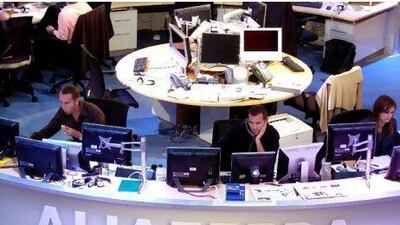Al Jazeera and the Jordanian government have apparently reached a stalemate in discussions over the alleged blocking of FIFA World Cup coverage, even though the Doha media company claims to have evidence several of its match broadcasts were deliberately disrupted by saboteurs in Jordan.
The channel was the subject of a concerted campaign of "space terrorism", according to an Al Jazeera official quoted in the debut issue of Rolling Stone Middle East.
The magazine's "inside story" about the blocking of World Cup coverage on Al Jazeera sports channels exposes a deadlock between the broadcaster, which is funded by the Qatari government, and officials in Jordan.
Viewers across the MENA region experienced interference while watching the broadcasts of several games. The disruption included pixellated images, blank screens and commentaries in the wrong language.
Al Jazeera hired Integral Systems, a US provider of "interference detection and geolocation" services, which claimed to have traced the source of the jamming to Jordan.
Al Jazeera contacted the Jordanian minister of media affairs and communications, requesting the government's assistance in finding the source of the disruption.
But the Jordanian government said it would only co-operate if Al Jazeera provided evidence of signal jamming, according to Rolling Stone. This led to a deadlock, as Al Jazeera was not willing to supply the evidence before the Jordanian government specified the course of action it would take against the culprits.
"The main issue is that we would like to get a public response on how they are going to help us find the culprits - and how they will be dealt with - before sending the reports," an unidentified Al Jazeera source told Rolling Stone.
"Usually the law is written before any judgement is taken. We want to know what the parameters are. And know that justice will take place ," the source said. The source also claimed the Jordanian government should have ready access to information on the movements of satellite vans suspected of jamming the broadcasts.
"We're not accusing the government," the Al Jazeera source said. "But we've given them the time of the attacks, we've told them where it originated, so they should easily be able to find out from their records who moved equipment to that area on that day.
"In most countries in the world, whenever you move one of these vans around you need to get a permit to take it on the road. You can't just drive it around.
"They should be able to produce a list of everyone who owns this equipment in Jordan … So realistically, what we want is their complete assistance. That's the best thing they could do."
Officials in Jordan repeated there would be no investigation until Al Jazeera provided the evidence, according to the magazine.
The first edition of Rolling Stone Middle East hits the newsstands tomorrow. The initial print run will be 15,000 copies, distributed mainly in the UAE.
Adam Grundey, the editor of Rolling Stone Middle East, said the Al Jazeera story was an example of "political" articles the magazine will be running.
"Lots of people have been asking how we'd do political stories here and I think this is a really good example of how we can do that without watering down the content," said Mr Grundey.

